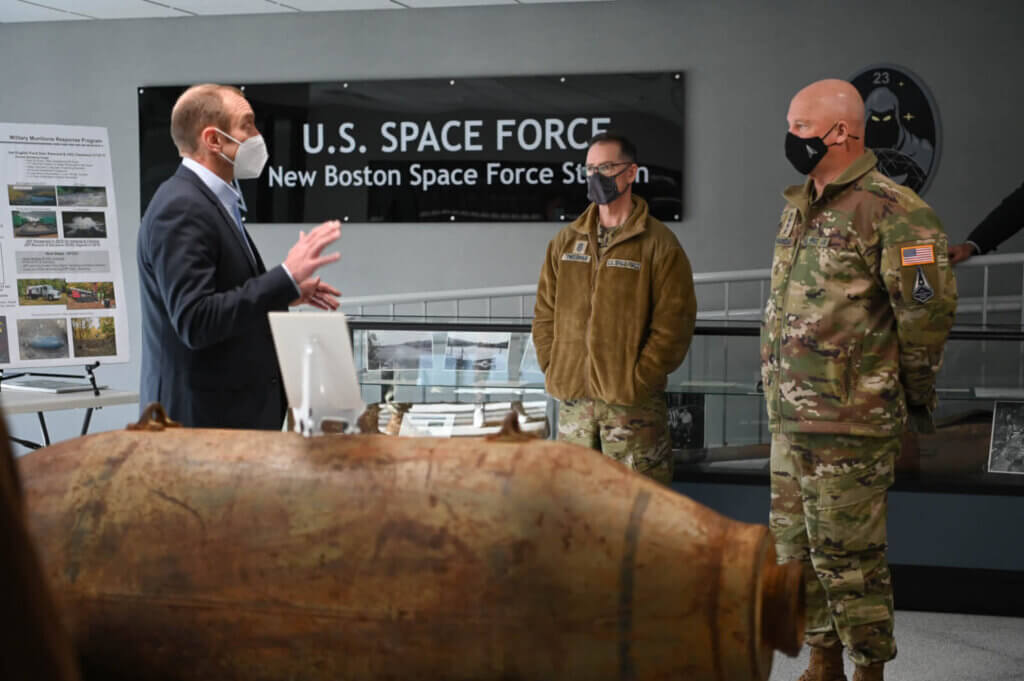Maintaining the status quo and not establishing a Space National Guard would lead to “increased bureaucracy,” according to leadership in the Colorado National Guard.
Col. Michael Bruno, chief of the joint staff of the Colorado National Guard, said the Air Force is focused on “fly, fight and win,” so if there’s a space component underneath the Air Force – where it currently resides – it won’t receive the same needed funding.
“It’s going to cause problems at the national level, but most importantly to our airmen, it’s a morale issue because they feel like they’ve been left behind,” Bruno said during a recent media roundtable hosted by the National Guard Association of the United States.
Col. Jason Knight, commander of the 195th Operations Group with the California Air National Guard, said “multiple studies” with the Department of Defense and Department of the Air Force determined the preference for a Space National Guard. Knight likened a “single-component solution” to a widget that only performs one task compared to a widget that performs several.
“It doesn’t give you that ability to assist state and local communities like we’ve seen over the last five years,” Knight said, noting that his forces are supporting the space fight daily, while also responding to California wildfires, COVID-19 missions and civil unrest.
Being a “one-trick pony,” he said, puts service members in a constrained environment.
Sens. Dianne Feinstein (D-California) and Marco Rubio (R-Florida) in early May introduced the Space National Guard Establishment Act as partner legislation to Rep. Jason Crow’s (D-Colorado) measure in the House of Representatives.
RELATED: Air Force diversity mission intended to cultivate ‘high-performing,’ ‘innovative’ recruits
Bruno said that a readiness issue would develop and interrupt space operations without a Space Guard component.
However, according to a September 2021 report from the Office of Management and Budget, the Biden administration has opposed the creation of a Space Guard.
“Establishing a Space National Guard would not deliver new capabilities — it would instead create new government bureaucracy, which the Congressional Budget Office estimates could increase costs by up to $500 million annually,” the Statement of Administrative Policy said. “The Air National Guard and Air Force Reserve units with space missions have effectively performed their roles with no adverse effect on DOD’s space mission since the establishment of the Space Force.”
Bruno said opposition to creating a space guard has been “founded upon an inaccurate congressional budget office report from June 2020.”
Reports suggest the cost to establish a National Space Guard would be between $100 million and $900 million. But Gen. Daniel Hokanson, chief of the National Guard Bureau, said during a May 2021 testimony that the actual cost would be around $200,000 and cover changing name tags and signage.
Future space guardians would remain at their current facilities and use existing equipment, said Bruno, who has nearly 20 years of experience in space operations and currently is the chairman of the NGAUS Space Task Force.
The Senate bill would not affect current military installations. If approved, the Secretary of the Air Force and the Chief of the National Guard Bureau would have a year-and-a-half to implement a Space National Guard.
Its implementation, according to Col. Adam Rogge, commander of the 233rd Space Group in the Colorado Air National Guard, would allow for promotion and long-term retention of guardians. Plus, the Space Force mission is “going down a different path” than the Air Force, Knight said, and if a commander oversees units aligned to the space and air forces, that creates operational and readiness challenges. And to move Air Guard forces into the Space Force would cost between $600 million and $700 million and a loss of seven to 10 years of readiness, he said.
The creation of a Space National Guard is a legislative priority for the National Guard Association of the United States.
The Space Force currently operates through Air National Guard units in the following states and territories: Alaska, California, Colorado, Florida, Guam, Hawaii, New York and Ohio.
Air National Guardsmen account for more than 10% of the Space Force’s manpower.
Editor’s note: An earlier version of this article incorrectly attributed a quote to Col. Adam Rogge. It has since been corrected.

